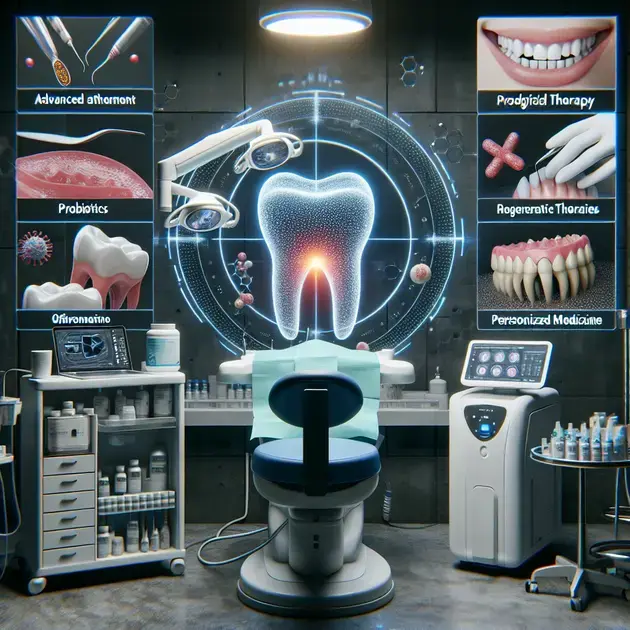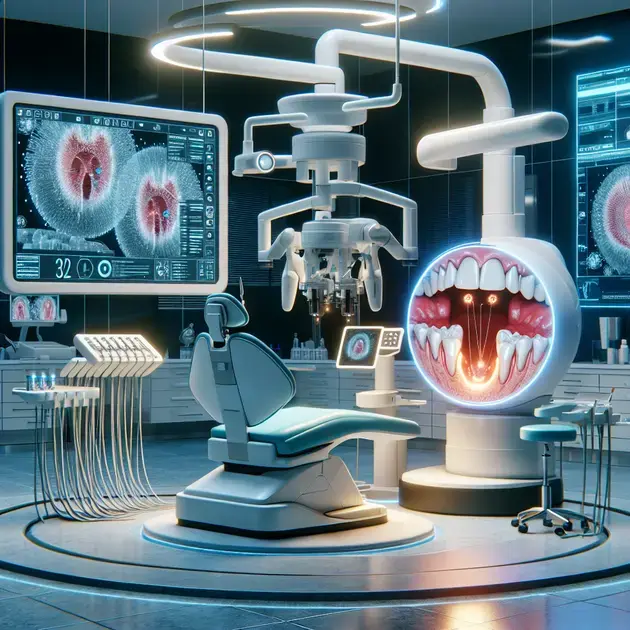Are you looking for effective medication for periodontitis? Look no further! In this comprehensive guide, we will explore the latest advancements in treating this common dental condition. Periodontitis, also known as gum disease, affects millions of people worldwide and can lead to serious oral health issues if left untreated.
With the rapid advancements in dental technology, there are now more options than ever for effectively managing periodontitis. From traditional treatments to innovative medications, this guide will cover everything you need to know to combat this prevalent condition and achieve optimal oral health.

Effective Medication for Periodontitis: An Overview
Periodontitis is a serious gum infection that damages the soft tissue and destroys the bone that supports your teeth. Proper medication is essential in treating this condition effectively. One of the most common medications prescribed for periodontitis is antibiotics. These drugs help to control the bacterial infection and reduce inflammation in the gums.
To find the most effective medication for periodontitis, it is crucial to consult with a dentist or periodontist. They will evaluate the severity of your condition and recommend the appropriate treatment. Websites like WebMD or the American Dental Association can provide valuable information on different medication options for periodontitis.
In addition to antibiotics, antimicrobial mouth rinses are also commonly used to treat periodontitis. These mouthwashes help to reduce the bacteria in the mouth and promote healing of the gum tissues. Look for products like Listerine or Colgate PerioGard, which are specifically designed to combat gum disease.
Another effective medication for periodontitis is subantimicrobial-dose doxycycline (SDD). This medication helps to inhibit enzymes that break down the gum tissue and bone, allowing for better healing and regeneration. Your dentist can provide more information on how to use SDD effectively.
In conclusion, effective medication is crucial in treating periodontitis and preventing further complications. By consulting with a dental professional and using the right medications, you can improve your oral health and protect your teeth for the long term.
The Latest Treatment Options for Periodontitis
Advancements in dental technology have led to a variety of new treatment options for periodontitis. One of the latest innovations is laser therapy, which uses high-intensity light to remove bacteria and infected tissue from the gums. Websites like Healthline or the Mayo Clinic offer detailed information on the benefits of laser therapy for periodontitis.
Another modern treatment option for periodontitis is regenerative procedures, such as guided tissue regeneration or bone grafting. These techniques help to rebuild the damaged bone and tissue around the teeth, promoting better stability and support. Your periodontist can discuss these options with you in more detail.
For those looking for non-invasive treatment options, air polishing is a gentle yet effective method for removing plaque and tartar from the teeth and gums. This procedure uses a combination of water, air, and fine powder particles to clean and polish the teeth. Websites like Colgate or Crest provide information on the benefits of air polishing for periodontitis.
In summary, staying informed about the latest treatment options for periodontitis is essential for maintaining good oral health. By exploring these innovative approaches and consulting with your dental team, you can find the best treatment plan to manage and improve your periodontal condition.
Achieving Optimal Oral Health: A Comprehensive Guide
Attaining optimal oral health involves a combination of good oral hygiene practices, regular dental check-ups, and healthy lifestyle choices. To start, it is crucial to brush your teeth at least twice a day and floss daily to remove plaque and bacteria that can cause gum disease. Websites like Oral-B or Colgate offer step-by-step guides on proper brushing and flossing techniques.
In addition to daily oral care, scheduling regular dental visits for cleanings and check-ups is essential for preventing periodontal problems. Your dentist can detect early signs of gum disease and provide timely treatment to avoid complications. Use platforms like Zocdoc or Healthgrades to find a reputable dentist in your area.
Maintaining a balanced diet rich in fruits, vegetables, and lean proteins can also contribute to optimal oral health. Avoiding sugary snacks and beverages can help prevent cavities and gum disease. Apps like MyFitnessPal or Lose It! can assist you in tracking your daily food intake and making healthier choices for your teeth and gums.
Lastly, avoiding habits like smoking and excessive alcohol consumption is crucial for maintaining a healthy mouth. These habits can increase the risk of periodontal disease and other oral health issues. Consider using cessation apps like QuitGuide or Smoke Free to help you quit smoking and improve your oral health.
In conclusion, achieving optimal oral health requires a commitment to proper oral hygiene, regular dental care, and healthy lifestyle habits. By following a comprehensive approach to oral care and utilizing available resources, you can prevent and manage periodontitis effectively while promoting overall wellness.

Effective Treatment Strategies for Gum Disease
Gum disease, also known as periodontal disease, is a common oral health issue that affects the tissues surrounding the teeth. It is important to implement effective treatment strategies to prevent further damage and restore gum health. One of the key strategies for treating gum disease is maintaining good oral hygiene. This includes brushing and flossing regularly to remove plaque and prevent the buildup of bacteria that can lead to gum inflammation.
In addition to good oral hygiene practices, seeking professional dental care is essential for treating gum disease. Dentists can perform deep cleanings, known as scaling and root planing, to remove plaque and tartar from below the gumline. They can also prescribe medications such as antibiotics to help control the bacterial infection that causes gum disease.
Another effective treatment strategy for gum disease is undergoing periodontal surgery. In cases where the disease has advanced and caused significant damage to the gums and bone, surgical intervention may be necessary to restore oral health. Procedures such as flap surgery and bone grafting can help repair damaged tissues and promote gum tissue regeneration.
Furthermore, adopting a healthy lifestyle can contribute to the effectiveness of gum disease treatment. Eating a balanced diet rich in nutrients can support gum health, while avoiding tobacco products can help prevent further damage to the gums. Regular exercise and stress management techniques can also play a role in improving overall oral health.
In conclusion, implementing a combination of good oral hygiene practices, professional dental care, surgical interventions when necessary, and a healthy lifestyle can be effective treatment strategies for gum disease. By following these strategies and working closely with your dentist, you can improve gum health and prevent further complications associated with periodontal disease.
Maximizing the Benefits of Periodontitis Medication
When it comes to managing periodontitis, medication can play a crucial role in controlling the bacterial infection and reducing inflammation in the gums. To maximize the benefits of periodontitis medication, it is important to follow your dentist’s instructions carefully and take the prescribed medication as directed.
One key aspect of maximizing the benefits of periodontitis medication is to adhere to the recommended dosage and schedule. Skipping doses or taking more medication than prescribed can compromise the effectiveness of the treatment and may lead to antibiotic resistance. It is important to set reminders or use pill organizers to ensure that you are taking your medication correctly.
In addition to proper adherence, it is essential to communicate with your dentist about any side effects or concerns you may have while taking periodontitis medication. Your dentist can adjust the dosage or switch to a different medication if needed to minimize side effects and maximize the benefits of treatment.
Another way to enhance the benefits of periodontitis medication is to combine it with other treatment strategies, such as professional cleanings and surgical interventions. By addressing the underlying cause of gum disease and promoting gum health through a comprehensive approach, you can improve the effectiveness of medication and achieve better outcomes.
Furthermore, maintaining good oral hygiene practices, including regular brushing, flossing, and using an antiseptic mouthwash, can complement the effects of periodontitis medication. These habits can help control plaque buildup and prevent the progression of gum disease, allowing the medication to work more effectively.
Innovative Approaches to Enhance Periodontitis Treatment
With advancements in dental technology and research, there are innovative approaches that can enhance periodontitis treatment and improve outcomes for patients. One such approach is the use of laser therapy to target and eliminate bacteria in the gums. Laser treatment can help reduce inflammation, promote tissue regeneration, and minimize discomfort during the procedure.
Another innovative approach to enhancing periodontitis treatment is the use of probiotics to restore a healthy balance of bacteria in the mouth. By introducing beneficial bacteria, probiotics can help reduce the growth of harmful bacteria that contribute to gum disease and support overall oral health.
Additionally, regenerative therapies such as platelet-rich plasma (PRP) and growth factors can stimulate tissue repair and regeneration in the gums. These therapies can help accelerate healing after surgical interventions and promote the growth of new gum tissue, leading to improved periodontal health.
Dental professionals are also exploring the use of personalized medicine in periodontitis treatment, tailoring therapies to individual patients based on genetic factors and specific oral health needs. By customizing treatment plans, dentists can optimize outcomes and provide targeted care to address the unique challenges of each patient’s gum disease.
In conclusion, incorporating innovative approaches such as laser therapy, probiotics, regenerative therapies, and personalized medicine can enhance periodontitis treatment and improve overall oral health outcomes. By staying informed about the latest advancements in periodontal care and working with your dentist to explore these innovative options, you can achieve better results in managing gum disease.
Conclusion
Addressing gum disease requires a multifaceted approach that combines diligent oral hygiene practices, professional dental care, surgical interventions when necessary, and a healthy lifestyle. By maintaining good oral hygiene through regular brushing and flossing, individuals can prevent plaque buildup and minimize the risk of gum inflammation. Seeking professional dental care for deep cleanings and prescription medications helps control bacterial infections that cause gum disease and can halt its progression.
Maximizing the benefits of periodontitis medication involves following prescribed dosages and schedules diligently to avoid compromising treatment effectiveness. Open communication with your dentist about any side effects or concerns is essential for optimizing medication benefits and minimizing adverse reactions. Combining medication with other treatment strategies like professional cleanings and surgical interventions can enhance overall outcomes and promote better gum health.
Innovative approaches, such as laser therapy, probiotics, regenerative therapies, and personalized medicine, offer new avenues for enhancing periodontitis treatment. Laser therapy targets bacteria, reduces inflammation, and aids in tissue regeneration, while probiotics restore healthy bacterial balance in the mouth. Regenerative therapies stimulate tissue repair and growth, and personalized medicine tailors treatments to individual needs for optimized results.



